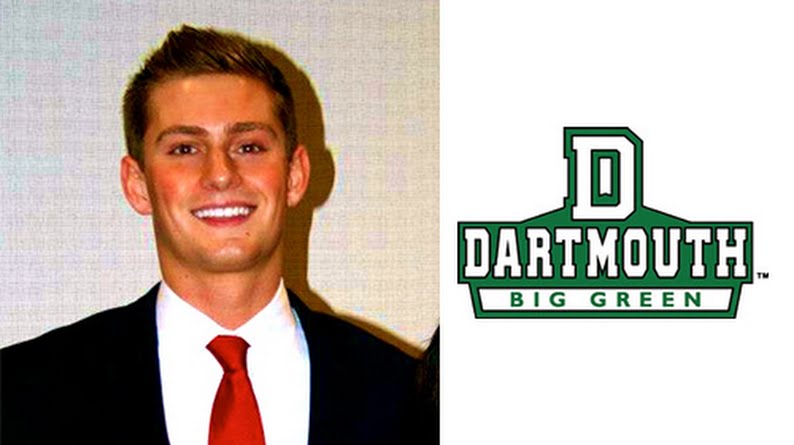Dartmouth Runner Rex Woodbury Tells Coming Out Story

Rex Woodbury is a junior economics and applied mathematics major at Dartmouth helping bring the message of inclusion and respect in athletics to his campus. Below, he tells his own coming out story, and talks about how he sees the role of athletes in the debunking stereotypes in the LGBT community.
“Dad, there’s something I want to tell you. I think I might also be interested in guys.” My dad smiled, put down his fork, and gave me a hug. “You know I’ll always love you. And remember what John Lennon said: love is love.” I smiled and breathed a sigh of a relief. “So?”he asked “What movie do you want to watch tonight?”
My dad was the first person I talked to about my sexuality, in March of my sophomore year of college. I remember being reluctant to use the word gay — it still had a bitter taste in my mouth. I had a girlfriend at the time, and I didn’t want to rule out the possibility of a future with a wife and kids. I remember my dad’s nonchalance (purposefully not making it into a big deal); I wanted to talk about it more, but we continued on with our lives and didn’t bring it up again.
Two months later, I was asked to introduce the Dartmouth Athletic Department’s You Can Play video at the Celebration of Excellence, an annual end-of-the-year banquet for hundreds of Dartmouth student-athletes, coaches, and administrators. While introducing the video, I decided to go a little off-script. “This is something I’ve always struggled with,” I told five-hundred sets of eyes. “I’ve always wanted to embody the perfect kid — a great student, a great athlete, someone everyone wants to be — and because of this I never told anyone that I’m gay. But I want to challenge the stigmas in athletics: it’s possible to be a good athlete, to be masculine, and to also like other guys.”
Here’s some more background on Rex:
I was born in Farmington, CT. My mother, an anesthesiologist and marathon runner, passed away when I was a year old and my dad soon moved the family to Tucson, AZ. I grew up in the desert with my dad and my brother — the two most important people in my life. My dad practices orthopedic surgery in Arizona. My brother is now a senior at Penn and will be following our parents into medicine, attending Johns Hopkins Medical School.
I played soccer and basketball growing up before going out for the track team in 7th grade. I immediately fell in love with running. Dartmouth was an easy choice — my dad was an alum and, since I was a boy, I’d wanted to go to school in the woods of New Hampshire. Today, I’m a junior at Dartmouth studying economics and applied mathematics and competing on the men’s track & field team. I’ll be working in the Investment Banking division at Goldman Sachs this summer and pursuing a career in finance.
Q: How do you see an organization like Athlete Ally benefitting the culture of athletics at Dartmouth?
A: Athlete Ally is unique in that it focuses on the straight allies of LGBT student-athletes. We need to foster a community in our Athletic department that supports diversity and embraces all student-athletes. We have to break down societal stigmas of sexuality in sport, and the way to do this is by educating and building relationships with straight allies. AA will be instrumental in changing the way Dartmouth perceives sexual orientation in Athletics and will allow all our student-athletes to feel comfortable being themselves, in the classroom, on the field, and in thelocker room.
Q: Do you think the climate for LGBT student-athletes at Dartmouth is a welcoming one?
A: I think that Dartmouth still has a long way to go. We aren’t as far along as some schools in more progressive areas, like those in New York City or Philadelphia. I think that while many at Dartmouth embrace those of all sexual orientations, the remote location and widespread fraternity system make the school less progressive than some of its peers. I hope that Athlete Ally can help our student-athletes take the next step forward.
Q: Why do you think it’s important for athletics to be a safe space for everyone, both at the varsity and intramural level?
A: In order for an athlete to perform at the top level, he or she must feel completely comfortable and accepted. Only with this level of trust and understanding can a team function at the highest level. We’re all here with the same goal: make our team the best it can be, by winning games, scoring goals, and representing the Big Green. It shouldn’t matter who you love, as long as you’re willing to commit to the team and represent Dartmouth.
Q: Do you think professional athletes standing up as allies for the LGBT community is necessary for progress?
A: There are still tremendous stigmas in society surrounding homosexuality in athletes, and a surprising lack of professional athletes tackling this issue and standing up for what is right. Having role models — both openly LGBT athletes as well as allies of the LGBT community —will help deconstruct these stigmas and allow us to combat homophobia in sports.
Q: Do you think teams with open, inclusive policies where all members feel free to be exactly who they are, will win more?
A: Yes. I feel strongly that the best teams are those that are close-knit, trust each other, and support each other. It is impossible for a player to perform his best while keeping an integral part of himself from his teammates. An atmosphere of openness and support fosters a team mentality that wins games.
Rex can be reached at rexford.r.woodbury.15@dartmouth.edu